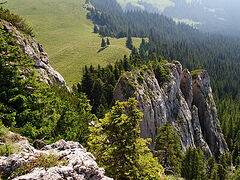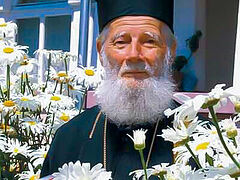For the 20th anniversary of the repose of the holy and Venerable Dionisie of Romania and Mt. Athos (1909–2004), who will be canonized in 2025.
The following article was originally published in “Familia Ortodoxa” No. 5 (64), May 2014.
 Cell of the Great Martyr George at Colciu Skete. Photo: Fr. Silviu Cluc
Cell of the Great Martyr George at Colciu Skete. Photo: Fr. Silviu Cluc
“So you can direct your mind and it will be closer to God, forever…”
In 1965, when Fr. Gimnazie departed to the Lord, his beloved brother in flesh and spirit Fr. Dionisie was forced to take the wholeburden of the priesthood and spiritual fatherhood upon his shoulders; and in 1979, when Fr. Gedeon also reposed, he became the abbot of the cell, according to the rules of the Holy Mountain.
Father described the order of the ascetic life:
It’s exactly the same in the cells as it is in the monastery. You have a set time when you have to go read Vespers. There’s an appointed time after Vespers when you can refresh yourself with some food; a set time after dinner when you go read Compline. After that you go to your cell, and if there are a few hours left before you have to go to church, then you read the lives of the saints, that is, spiritual books that a monk needs to know—the lives of all the ascetics of piety. And you definitely have to complete your usual rule before the church bell starts to ring. You make 150 prostrations and go twelve times around your prayer rope with bows from the waist. It takes an hour or so. You should commune of the Holy Mysteries once every two weeks, because that’s how it was when I came to the Holy Mountain. After the service on Friday morning, you had to go tell your confessor about your thoughts, how you sinned, what you did. After you confess, go back to your cell and read the rule for Communion,
This is what he had to say about the rule of the Jesus Prayer:
In the Cell of St. Anna, the old-timer monks say that at the large skete, they would fulfill their rule and even the Vigil by praying the Jesus Prayer. Out loud. It was for everyone. They would go out to the middle of the church one by one and pray: “Lord Jesus Christ, Son of God, have mercy on us. Lord Jesus Christ…” And the other monks would listen attentively, not dozing. Then one of the fathers, adorned with grace, saw the Savior descend to the middle of the church and stand there, listening to their prayers.
Therefore, we have to say the Jesus Prayer. If a man, a monk, would say, “Lord Jesus Christ,” with every breath, then little by little he would learn noetic prayer and be adorned with it. Now it may be impossible for us to achieve noetic prayer, but to say the Jesus Prayer all day is the most blessed work. The enemy hears it and can’t draw near to you.
At the end of the twentieth century, with the arrival of Elder Joseph to Vatopedi Monastery and with the new flourishing of cenobitic life there, Colciu Skete also saw a multiplication of the number of monks, which rejuvenated and strengthened the old brotherhood.
A little later, God permitted a new trial for Fr. Dionisie: He lost his sight. Although he found it difficult to bear, as he was very physically active, Father later said:
“I prayed to the Mother of God to send me a gift: that I wouldn’t grumble from this blindness, and that she would have mercy on me. Now she’s made it clear to me that the state I’m in is good for me. And now I’m calm. It was and is useful for me to be like this.”
One of the few consolations left to Fr. Dionisie after he went blind was to sit on a bench near his cell and listen to the sounds of nature:
“When I listen for a bit, this is my consolation. Because if you can’t see anymore, then how can you rejoice? You have no joy at all. How many photos, how many icons I could see… but how to rejoice if you can’t see? But thank God! May God help us; may He fulfill my desire for holy salvation!”
“Rarely have I seen a man so noble as Fr. Dionisie”
 Archimandrite Ephraim, abbot of Vatopedi Monastery, with Elder Dionisie on the threshold of his cell Fr. Dionisie gave rest to whomever knocked on the door of his cell. Romanians, Greeks, Russians, Bulgarians, laymen and monks coming from the most unexpected corners of the world would receive an answer to their existential questions and counsel and help to know the depths of their hearts and acquire peace. The Elder wasn’t like the sages of this age, and strictly speaking, he had no education; he spoke to everyone according to their needs. And as we knew him and understood him, three virtues remained in our hearts that he, whether by word or through his life, humbly placed before those who came to him thirsting to hear words of eternal life. And these three virtues are obedience, patience in tribulations, and humblemindedness,
Archimandrite Ephraim, abbot of Vatopedi Monastery, with Elder Dionisie on the threshold of his cell Fr. Dionisie gave rest to whomever knocked on the door of his cell. Romanians, Greeks, Russians, Bulgarians, laymen and monks coming from the most unexpected corners of the world would receive an answer to their existential questions and counsel and help to know the depths of their hearts and acquire peace. The Elder wasn’t like the sages of this age, and strictly speaking, he had no education; he spoke to everyone according to their needs. And as we knew him and understood him, three virtues remained in our hearts that he, whether by word or through his life, humbly placed before those who came to him thirsting to hear words of eternal life. And these three virtues are obedience, patience in tribulations, and humblemindedness,
recalls Archimandrite Ephraim, the abbot of Vatopedi Monastery.
When he learned that many people had photographed him without his knowledge, Fr. Dionisie lamented and said:
“What photos? What’s there to photograph? A poor old man who can barely walk? They want to make a saint out of me. But I’m like a dead man—a little while longer and I’ll be gone.”
 Elder Joseph of Vatopedi Elder Joseph of Vatopedi, a disciple of the great Elder Joseph the Hesychast, saw him as his co-laborer in prayer, and until his last days would visit Elder Dionisie for counsel and Confession, and other Vatopedi fathers would send various pilgrims to him who were looking for spiritual nourishment. Father would humble and reproach himself:
Elder Joseph of Vatopedi Elder Joseph of Vatopedi, a disciple of the great Elder Joseph the Hesychast, saw him as his co-laborer in prayer, and until his last days would visit Elder Dionisie for counsel and Confession, and other Vatopedi fathers would send various pilgrims to him who were looking for spiritual nourishment. Father would humble and reproach himself:
“Vatopedi keeps sending people to me, telling them I’m a spiritual man, but it’s not true. I can’t even see them—what am I supposed to tell them? I don’t have the gift of words! What should I, a poor blind man, tell them?”
Having attained the measure of perfected wisdom, Father taught his disciples:
We know that our way of life tends not to be so monastic anymore, receiving laymen, serving them, and this despite the fact that many come here only to tempt us. And we don’t really know their hearts; it’s all just how it seems to us. Let us try to have love, to show them love. Although we know that it’s hard and quite vexing, we have to do it so as not to harm ourselves from this side and that—because Orthodoxy doesn’t oblige us to see the mistakes of others, but to see ourselves, humble ourselves, and consider ourselves worse than all.
Perhaps the best description of Elder Dionisie’s earthly existence and angelic manner of living was given by the same Fr. Ephraim of Vatopedi:
He moved to the Cell of St. George at Colciu Skete in 1937, and until his departure to the Lord, he spent nearly seventy years in a humble room, all of fifty-four square feet, in patience and the thirst for silence. But he came to know Christ there and immutably understood that, as Geronda Joseph the Hesychast said, at the end of patience, when all human consolations are gone, the sweetness of Divine consolation descends into the heart.
His entire being breathed humility: his bright face, his warm smile, his meek and edifying word, his modesty, kindness, and simplicity, the way he hid his monastic labor and his deeds—in a word, his spiritual nobility. Rarely have I seen a man so noble as Fr. Dionisie.
May his blessing be upon us!



